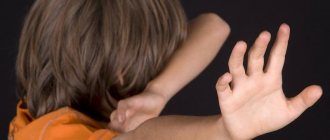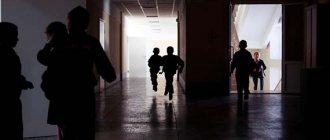For criminal acts against minors, Russian criminal legislation provides for rather severe penalties. And this is quite logical, because... Children belong to the most vulnerable category of the population, therefore, respecting their rights and ensuring their safety stands apart in every civilized country in the world.
Quite often, minors find themselves victims of criminal schemes (theft, begging, prostitution, etc.) in which adults involve them, and less often children suffer from abuse by their parents. In all cases, the criminal law is equally harsh towards those who infringe on the rights and freedoms of a child. Today the punishment is quite long terms of imprisonment.
But cases are no less common when the subject of a crime (criminal) turns out to be the same minor as the victim of criminal acts. What does criminal law say about this? In our article we will tell you what parents should do if their child was beaten at school.
The first actions of parents when a child was beaten at school
You can learn about the fact of beating from the victim himself, from a classmate, or simply notice traces of beatings on the child’s body.
It happens that children call from school and tell in tears what happened to them. In this case, mom and dad should hurry to the school. Since teachers are responsible for the health of children while they are in class. Information about what happened quickly becomes known to the director of the establishment, especially if the injuries are serious.
Arriving parents must immediately go to the manager’s office and demand that an accident report be drawn up.
Important! The director will in every possible way prevent the preparation of such documents, since public publicity of the incident may attract an inspection by employees of the Department or the Education Directorate.
However, if children have quarreled, torn clothes or caused other property (not bodily) harm, you should stop talking with parents, without advertising particularly hostile relations between teenagers. This can happen in the early grades, when children cannot yet cause serious injuries to each other if they do not use heavy objects at hand.
Systematic beatings should serve as the basis for contacting the district administration in the juvenile affairs department. In this case, the culprit will be registered and will be periodically summoned to the juvenile affairs commission.
Returning to a serious fight, it should be noted that a certificate from the school doctor should not be taken as a basis. An external examination may not always indicate the extent of the injury. Moreover, the lack of qualifications to determine harm to health will make it impossible to qualify the act in accordance with the consequences of a fight.
Of course, parents should contact the police and the emergency room. If the child cannot move independently, then it is better to call the emergency number and call a medical team to the scene. This will reduce the time it takes to register a victim at a medical facility (ambulance patients are admitted out of turn).
Fight in class. Is it not the teacher's fault?
Recent episode. The standard “boys got into a fight.” During gym class, in the locker room. The mother of one of the injured boys, in her hearts, went to remove the beatings from her son and write a statement to the police. The teachers were perplexed: well, just think, it’s a boy’s fight, why make a fuss?
And the situation looked like this. The two boys were excused from PE due to health reasons and were in the locker room. The other two came without a uniform, were not allowed to attend the lesson and also sat in the locker room. And with nothing else to do, they began to come up with “harmless” pranks: throwing plastic bottles in their faces, sprinkling seeds on the boys who were exempt from physical education. Further - progressively. Well, the boys were bored, so they had fun as best they could. And, since none of the adults were around and there was no one to stop the chaos, the guys became more and more angry. The result was a fight that almost led to serious injuries.
I’m talking to the victims: why didn’t they contact the physical education teacher? Yes, because he waved it off and told us to figure it out ourselves. The teacher is perplexed: what is the problem? Just think, the boys got into a fight. Don't interrupt the lesson because of this. And here are the parents with complaints. Complaints, reports. They make mountains out of molehills instead of teaching children to stand up for themselves. They raise wimps.
Who is right in this situation? Personally, I am completely on the side of the “scandalous” mother, who rightly believes that her son should be provided with minimal security during a school lesson.
Contacting medical institutions and police authorities
Parents should contact the police and ambulance if their child is hit at school.
A medical institution will be able not only to relieve pain, but also to determine the severity of the consequences in accordance with the standard classifier. A medical examination will make it possible to isolate injuries that were not received in a fight (for example, a child previously fell from a tree, resulting in a hematoma).
Upon completion of the examination, the physician will issue a report detailing the injuries and the nature of their infliction. If a child complains of any pain, and the doctor does not pay attention to it, then it is necessary to request additional research and samples (for example, a child complains of pain in the lower abdomen, the doctor included information about this in the conclusion as a lesion of soft tissues, and When collecting urine, blood is visually detected, that is, more serious consequences on the internal organs are obvious).
You should write a statement to the police. Indicate by whom and under what circumstances the victim was beaten. You can indicate who the parent suspects if the victim does not admit to what happened.
The police officer will not only interview the parents, neighbors, and friends of the offender, but will also make a request to the local police station about the characteristics of the teenager (the child may have repeatedly beaten other children in the courtyard of a residential building and the police officer was informed about this).
Based on the circumstances of the case, the policeman concludes that it is possible to initiate a criminal case or it is enough to draw up a resolution on an administrative offense and bring the fighter’s parents to justice.
We resolve the conflict on our own
Photo: friendsmeetingschool.org
Not every conflict needs to be resolved with the help of police officers. Especially if this is an isolated case. It is usually enough to discuss the situation with the offender's parents. You can do this in the following ways:
- In a personal conversation
. This option is possible if the parents have ideas about the family of the offender or the parents know each other. Before the conversation, you need to be prepared for the fact that the other side will defend their child and justify him. Therefore, obtain evidence in advance that you are right. Explain the consequences of further bad behavior. Prepare legally for the conversation. This usually results in an apology and an offer to make amends.
- At a school or parent meeting.
If the school tends to resolve all conflicts as a united team, then this option will be good. Such a meeting must be recorded on paper and supervised by a lawyer. Otherwise, there may be an incorrect discussion of the offender’s actions, which will also be a reason for filing a counter-accusation.
What responsibilities are provided?
Beating in an educational institution always constitutes either an administrative offense or a criminal offense.
If in the first case, penalties will follow, which should cover the costs of treatment. In the second case, real criminal liability may follow.
There are 2 influencing factors:
- reaching the age of bringing to personal responsibility;
- the severity and relationship of bodily injuries with beating.
At this stage, it is important to understand that responsibility can be imposed not only and not so much on the teenager, but on the parents.
Parents bear full responsibility for the actions of their children until they reach the age of being subject to one of the types of responsibility. And in some cases, after a certain age, when the punishment is provided in the form of a fine, and the child has no income.
An important rule about the impossibility of replacing the subject of a violation of public peace with another person does not apply when it comes to blood ties with minor offenders.
So, by what signs can you determine that a child needs your help and it’s time to intervene?
- The child often comes with bruises and scratches for which there is no reason.
- A child’s things often “break,” “spoil,” or “get lost.”
- The child is constantly looking for an excuse not to go to school - he invents illnesses, heats a thermometer on the radiator, refers to a sore stomach and head, and so on.
- The child began to eat and sleep poorly. Health problems and nightmares appeared at night.
- Academic achievement falls, as does interest in school activities in general.
- The child is constantly depressed and reluctant to make contact.
- There are cases of running away from home, attempts at self-harm, etc.
- The child’s backpack and uniform often get “torn” and “dirty.”
If at least 3-4 symptoms coincide and are repeated day after day, rest assured that your child needs your help.
In what cases can there be criminal punishment?
If it was possible to record minor, moderate or severe bodily injuries, the offender may face criminal liability. However, the law gradates the subjects of such crimes depending on age.
Minor bodily injury is punishable from the age of 14, while moderate and severe bodily injury will result in punishment for a 16-year-old offender.
In addition, if the offender commits an illegal act for the first time and the severity is determined to be mild, then punishment will not be applied. In this case, the minor may be given a warning, re-education with the participation of a psychologist, or a measure to limit leisure time will be applied.
Unlike administrative punishment, criminal punishment cannot be applied to the boy’s parents (although the father can pay a fine for his son, but the verdict will indicate that it was the teenager who beat the victim).
If the victim’s relatives filed a civil lawsuit together with a criminal one, then one punishment will be assigned unambiguously. This punishment will most likely be expressed in compensation for treatment costs and compensation for moral damages.
Who gets bullied the most?
Perhaps there are no school classes in which there is not at least one “special” child - he gets buttons on the chair, notebooks with lines, offensive words scratched out on his desk. They laugh at him, take him for a nerd or a black sheep, try to avoid him and don’t even say hello. What is he doing wrong? Let us highlight the main reasons why a child begins to be bullied in a group.
| Physiology | “Not like everyone else” - it would seem that this is wonderful when a child has his own peculiarity. But it is precisely this factor that often becomes the reason for ridicule and offensive words from classmates. Overweight, excessive thinness, big ears, freckles, bright red hair, short stature, some flaws like acne or scars - there are many options. |
| Diction | Problems with the pronunciation of certain sounds or words often provoke children to offend each other. |
| School marks | Moreover, both bad and good. You do worse than everyone in the class - a “low student”, the best - “nerd”, “crammed”, “boring”. |
| Behavior | Children are different: active and slow, aggressive and calm, smiling and dejected, open and withdrawn. Many people will decide to offend a child because he does something slower than others or more hectic. |
| Appearance | Children from low-income families who are forced to wear modest clothes, have a meager supply of personal belongings, and do not have a mobile phone or money for lunch often fall under the negative attitude of their peers. They are sometimes treated very cruelly, especially if the contrast with the others is significantly noticeable. |
Involving school administration
It is possible and necessary to complain about the school in such a situation, because the school assumes obligations in accordance with the Law “On Education”. In addition to writing a complaint to regulatory authorities to find those responsible for what happened, you can demand compensation from the school for damages. A child could only be beaten if the children were not under the supervision of teachers. That is, we can talk about the negligent attitude of employees (head teacher, director, class teacher) whose work is related to preventing such situations.
Moreover, the student will most likely have to transfer to another school, where he will not be bullied by his peers, knowing that the child was hit by other children in the previous educational institution.
Each country has its own nuances of prosecuting minors for aggression at school. The situation in Ukraine is similar to the Russian one.
Summary
What to do if a child is beaten by his classmates at school? Lawyers advise to be attentive to your children, to control their social circle, leisure time and educational process. Getting to know the teachers and having confidential conversations with the child will help prevent conflicts among peers and possible beatings.
If the situation is out of control, your son/daughter is in bad company, there is no mutual understanding with classmates and teachers, then you should protect your child in all possible legal ways. This could be a peaceful conversation with the perpetrators and their parents, an appeal to the school management, or a trial.
The main thing is not to enter into conflict with aggressors and not to break the law while trying to protect your baby. The assistance of competent lawyers will allow you to choose the right line of defense and legal support at all stages of the proceedings.









